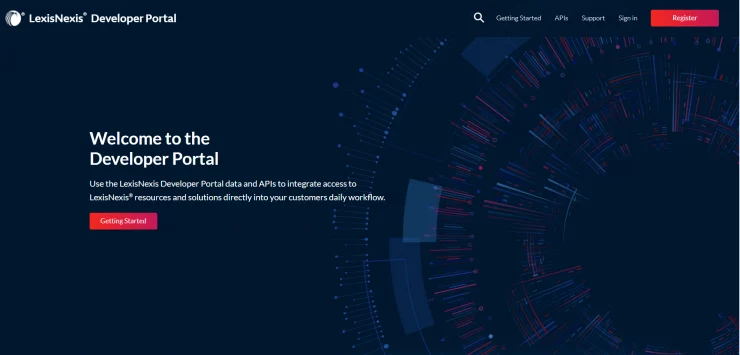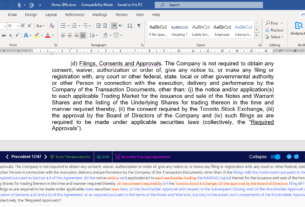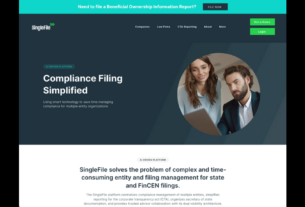LexisNexis Legal & Professional®, is releasing a new API Developer Portal which will enables law firms and legal departments to integrate Lexis proprietary legal content, news, dockets, business data, and analytics from a variety LN products into firm portals,![]() dashboards and workflows. Business intelligence has been one of the hottest areas of law firm investment and innovation. For years I have criticized Lexis for accumulating a offering a federation of wonderful products sitting in separate platforms. At least 5 year’s ago CEO Mike Walsh assured me that they were building a Lexis ecosystem. Well today they have surpassed that promise by allowing customers to select content from across that ecosystem and weave it into internal systems in order to streamline workflow and enhance insights
dashboards and workflows. Business intelligence has been one of the hottest areas of law firm investment and innovation. For years I have criticized Lexis for accumulating a offering a federation of wonderful products sitting in separate platforms. At least 5 year’s ago CEO Mike Walsh assured me that they were building a Lexis ecosystem. Well today they have surpassed that promise by allowing customers to select content from across that ecosystem and weave it into internal systems in order to streamline workflow and enhance insights
In a recent demo of the API’s Jeff Pfeifer Chief Product Officer, LexisNexis North America and UK indicated that 90% of Lexis data is now available through the Lexis API’s, The goal is to meet customer’s where they work and provide them with and enriched workflow experience. One of the most important benefits of the Lexis data offering is the data classification and normalization process which enhances the accuracy of data.
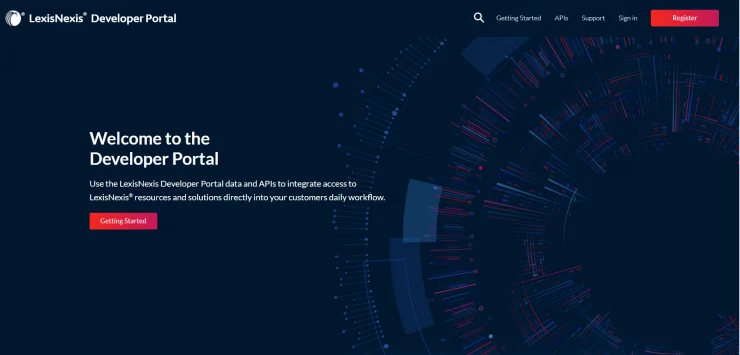
Pfeifer is quoted in the press release: “LexisNexis recognizes that many organizations are investing heavily to enrich their proprietary data collections in order to make their attorneys more productive. Our new API Developer Portal enables organizations to enrich and normalize their internal data by directly incorporating our industry-leading data and content. Doing so helps organizations unlock the insights in their data and minimize workflow disruptions.”
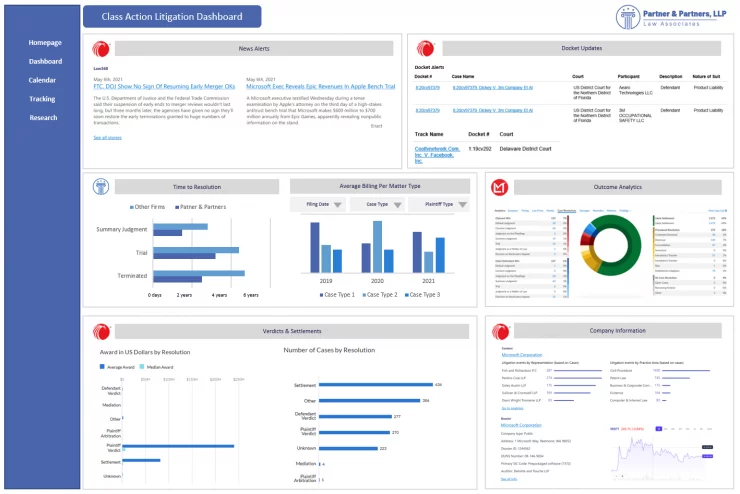
The self-service Developer Portal contains APIs that offer content from Lexis+, CourtLink, Context and State Net. A new Lex Machina API is available and will be integrated into the portal. Additional API’s are in the works. Developers can run practical tests of API applications in a new ‘sandbox’ environment. The Portal also includes extensive data schema information and technical guidance documentation.
The press release outlines the benefits of APIs .though its WIRE framework:
- Workflow: Incorporates LexisNexis news, content, data, analytics and insights directly into an organization’s work environment.
- Integration: Enables organizations to combine LexisNexis data and analytics with internal and third-party data in a single search and access associated documents without switching between multiple applications.
- Recency: Alerts users to changes in cases, dockets, legislation, regulations or news mentioning issues, clients or prospects, and delivers them via email or to their work environment. It also allows users to access the associated documents or news story right from the alert.
- Enrichment: Enables organizations to clean, normalize and tag their internal data to improve the accuracy and relevance of searches and better integrate with LexisNexis data and applications, such as Lex Machina and Context.
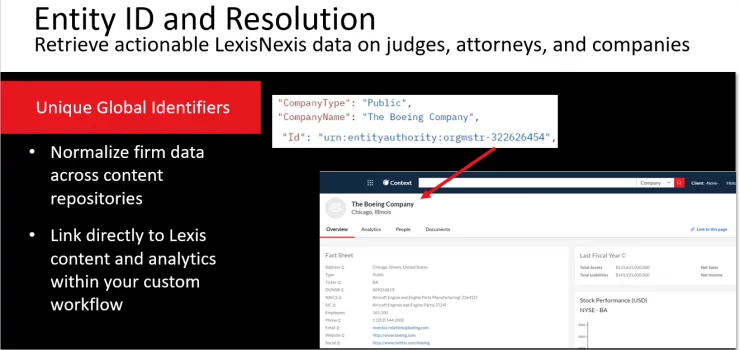
The Lex Machina API
For years law librarians and knowledge mangers have been begging legal publishers to free their data from their proprietary interfaces. Lex Machina a pioneer in delivering sophisticated litigation analytics was particularly stubborn in rebuffing customer requests for access to the data outside of their sophisticated environment. The Lex Machina platform offers data including case resolutions, damages, remedies, findings as well as a “normalized” taxonomy of judges, attorneys, law firms and parties,
Analytics data from Lex Machina can now be integrated with an organization’s Client Relationship Management (CRM) system, matter management or other internal applications. “One click widgets” can deliver targeted insights on an internal dashboard or portal page.
“Our top priority at Lex Machina is to bring legal analytics to all areas of law to ensure that our clients are provided with the most up-to-date, accurate and relevant information,” said Karl Harris, CEO of Lex Machina. “Our new API makes Lex Machina data available wherever you need it to seamlessly support the day-to-day operations of lawyers and in-house counselors.”
LexisNexis technical teams are also available to help organizations integrate one or more of the API types into their systems, depending on the organization’s needs:
- URL APIs: One-way, direct links to LexisNexis products, requiring minimal configuration
- REST/Web Services: Deeper integration into the organization’s workflows, requiring local coding and engineering for customization
- Bulk APIs: Optimizes the transfer of large data sets from one server to another, for use in data-mining, machine learning and predictive analytics initiatives
For additional information on the API Developer Portal, visit www.lexisnexis.com/API
